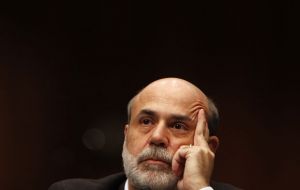MercoPress. South Atlantic News Agency
US October inflation year-on-year stands at 1.2%; fears of deflation
 Federal Reserve chairman Ben Bernanke
Federal Reserve chairman Ben Bernanke Inflation in the US slowed further in October, with “core” inflation - which excludes volatile food and fuel prices - up only 0.6% on a year ago. It is the lowest year-on-year increase on record, with core prices remaining unchanged for three months running.
The core inflation measure is closely watched by the Federal Reserve as a measure of price momentum.
The all-items consumer prices index (CPI) rose 0.2% in October, bringing its year-on-year rise to 1.2%. The higher overall CPI rate was mainly due to petrol prices, which are excluded from the core measure, and which jumped 4.6% from September, according to the US Department of Labour.
The latest price data will add further to the Fed's determination to pursue its new $600bn round of quantitative easing - buying up US government debt with freshly printed money - despite sharp criticism both inside and outside the US.
The Fed is assumed by most economists to target a CPI inflation rate of about 2%.
US government bonds rallied on the news, as investors raised expectations of further purchases by the Fed, while the dollar slipped 0.4% against the troubled euro. The Dow Jones stock market opened largely unchanged from Tuesday.
The Fed's chairman, Ben Bernanke, has made clear that the monetary authority will resist strongly any move towards deflation (falling prices).
Many economists believe deflation becomes self-perpetuating, as consumers put off spending decisions in the hope of cheaper prices, and borrowers find their debts harder to pay off. Japan has suffered two decades of stagnant growth and intermittently falling prices.
Meanwhile, other data showed that the number of new residential building construction projects dropped sharply in October. According to the US Department of Commerce, the number of housing starts dropped nearly 12% from September to a seasonally-adjusted annualised rate of 519,000 last month - just 21% above the record low set in January last year.
The data provides another indication of the continued severely depressed state of the US housing market. Housing starts during the boom year of 2005 were over two million.




Top Comments
Disclaimer & comment rulesCommenting for this story is now closed.
If you have a Facebook account, become a fan and comment on our Facebook Page!